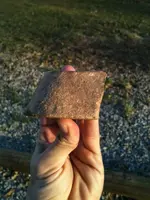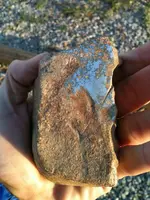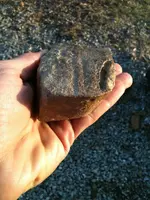Babbit metal....never heard of it or used it. Always learning something on the forums. Thanks! Now Im off to research spot tests for tin.

Babbitt, also called Babbitt metal or bearing metal, is any of several alloys used for the bearing surface in a plain bearing.
The original Babbitt metal was invented in 1839 by Isaac Babbitt[1] in Taunton, Massachusetts, USA. Other formulations were later developed (and Isaac Babbitt's exact formulation is not known with certainty).[2] To deemphasize the term's eponymous character, modern writers often lowercase it (babbitt metal—as with "diesel engine").[2][3] It is preferred over the term "white metal", which also refers to bearing metal, because "white metal" is an ambiguous term with various meanings.
Microstructure of babbitt
Babbitt metal is most commonly used as a thin surface layer in a complex, multi-metal structure, but its original use was as a cast-in-place bulk bearing material. Babbitt metal is characterized by its resistance to galling. Babbitt metal is soft and easily damaged, which suggests that it might be unsuitable for a bearing surface. However, its structure is made up of small hard crystals dispersed in a softer metal, which makes it a metal matrix composite. As the bearing wears, the softer metal erodes somewhat, which creates paths for lubricant between the hard high spots that provide the actual bearing surface. When tin is used as the softer metal, friction causes the tin to melt and function as a lubricant, which protects the bearing from wear when other lubricants are absent.
There are many Babbitt alloys in addition to Babbitt's original. Some common compositions are:
90% tin, 10% copper
89% tin, 7% antimony, 4% copper
80% lead, 15% antimony, 5% tin
76% copper, 24% lead
75% lead, 10% tin
67% copper, 28% tin, 5% lead
Internal combustion engines use Babbitt metal which is primarily tin-based because it can withstand cyclic loading. Lead-based Babbitt tends to work-harden and develop cracks but it is suitable for constant-turning tools such as sawblades.








